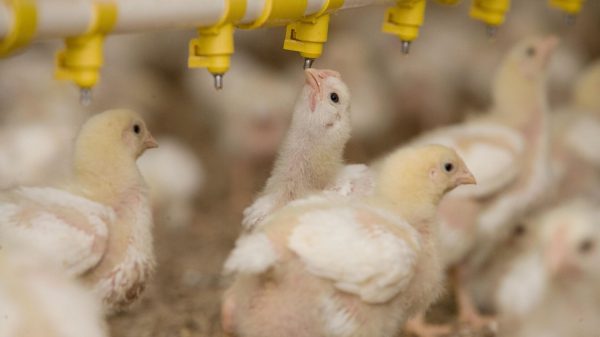
National leaders are starting to feel the heat over the EU’s struggling Covid vaccine rollout, which is increasingly being seen as overcautious, marred by mistakes and miscalculations, and achingly slow to progress.
Shaken by the weekend’s high-profile blunder in Brussels, both Angela Merkel and Emmanuel Macron felt the need to explicitly defend the bloc’s approach this week, as vaccination numbers continue to lag behind countries such as Israel, the UK and US.
UK passes 10m Covid vaccination milestone
Read more
The German chancellor conceded on Tuesday night that it “rankled” that others were vaccinating faster, but said the EU’s slower but collective strategy had been the right one. “All in all, I don’t think anything has gone wrong,” she said.
France’s president also said, in an unexpected TV appearance on Tuesday, that progress “may seem slow” compared with countries that had “made other bets”. But he added: “I defend the strategy we have adopted with Germany, with the EU.”
Both reiterated their pledge that a jab would be offered to all adults who wanted it by the end of the summer. EU member states have so far collectively administered at least one dose to just 3% of the population, against 59% in Israel, 15% in the UK and 10% in the US.
EU countries are at different stages in their struggle with the virus, with some, such as Italy and Poland, lifting lockdown restrictions and others, such as Germany and the Netherlands, retaining them, mainly over concerns about new variants.
France, meanwhile, hopes to avoid a third national lockdown as case numbers remain stable but comparatively high, while Portugal has been hit by a devastating surge and on Wednesday accepted doctors, nurses, ventilators and hospital beds from Germany.
Nonetheless, criticism of the EU’s slow vaccine rollout has been building, not least in Germany where media and politicians jostling in the run-up to September elections have taken aim at Merkel and her ally the European commission president, Ursula von der Leyen.
The EU’s decision to collectively purchase and distribute vaccines enjoyed broad support in principle, mainly because of the bloc’s experience in the first wave of the virus when several member states blocked exports of protective equipment.
A similar approach to vaccines would have led to wealthy countries such as Germany, France and the Netherlands doing well, while the likes of Croatia and Slovakia would have lost out, the former Finnish prime minister Alexander Stubb stressed this week.
“Small EU states would have had virtually no negotiating power,” Stubb tweeted. “Big states would have swept the doses.” Playing a national card when “the virus does not respect borders” would necessarily be “a race to the bottom … The key is to coordinate.”
But the commission, which had no experience of a public procurement exercise on this scale, handled negotiations with manufacturers more like the trade talks with which it is more familiar, focusing on price and questions of liability rather than securing a maximum of doses fast.
That led to late orders and, subsequently, supply shortfalls. Delays have also been compounded by the European drug regulator’s longer approval process, and by several states seemingly being ill-prepared for the doses that have arrived.
The EU’s top performers include Denmark, Ireland, Spain and Italy, all of which have delivered at least one dose to more than 3.5% of their populations. Underperformers include the Netherlands, Austria and France, on less than 2.5%.
Many EU countries, however, are focusing on delivering two doses within the interval recommended by vaccine manufacturers and the World Health Organization. By that measure, both Germany and Italy are outperforming the UK.
Merkel, Macron and Von der Leyen have all stressed the importance of public trust in the vaccination process, highlighting among reasons for the EU’s slow progress its decision not to follow Britain in seeking emergency approval for Covid shots.
Germany, France, Poland, Italy and Sweden have all announced they will avoid giving the Oxford/AstraZeneca vaccine to over-65s, citing a lack of data on its efficacy among that age group. Belgium has set the threshold at 55.
Emmanuel Rivière, the director of international polling at Kantar, said many Europeans were “torn between a desire to be vaccinated and a need to be convinced it’s safe”. He cited a survey for the commission showing that while a majority of those polled in the 27 member states said they wanted a jab, only 23% wanted it immediately, with 29% preferring “sometime in 2021” and 18% later still.
Although the EU’s drug regulator had yet to approve a single vaccine at the time of the poll in late December, 62% – including majorities in 19 countries – felt Covid vaccines were “being developed, tested and authorised too quickly” to be safe.
“There is a feeling that if this doesn’t happen too fast, it’s not too big a problem,” Rivière said. “People want to see how it goes. It’s ‘hurry up – but slowly’.” There is anger, too, against “big pharma”, widely seen as having played games.
Fabian Zuleeg of the Brussels-based European Policy Centre thinktank said he thought there was “perhaps a slightly different take on the continent, a feeling that speed is not all, that even if you vaccinate very quickly, that does not necessarily resolve everything”.
Zuleeg said he “understood the focus on vaccination numbers”, but would like to see a “broader discussion of their role amid other measures in the overall purpose, which is reducing excess deaths and preventing health systems being overwhelmed”.
Some European analysts point out that developed countries such as Australia, Japan and South Korea have not yet begun vaccinating at all – and some hope the EU’s approach will end up paying off.
“Acting together was the right choice for the EU, although avoidable mistakes were made,” said Stefan Lehne of the Carnegie Europe thinktank. “Rather than engaging in a blame game, the EU, member states, and pharmaceutical companies now need to work together to ramp up production as rapidly as possible.”



















































Свежие комментарии